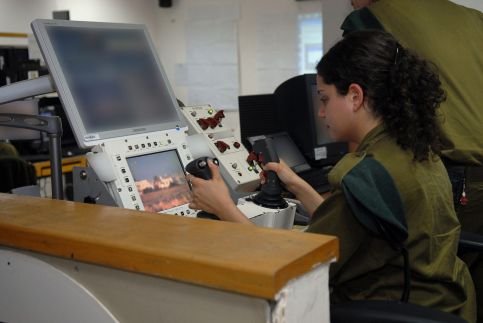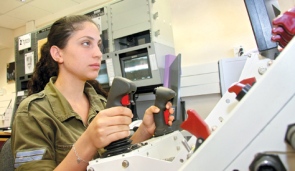
 Innovative Minds © 2014. All Rights Reserved. www.inminds.co.uk | |||||
Israel's video game killing technologyJonathan Cook, The Electronic Intifada It is called Spot and Shoot. Operators sit in front of a TV monitor from which they can control the action with a PlayStation-style joystick. The aim: to kill terrorists. Played by: young women serving in the Israeli army. Spot and Shoot, as it is called by the Israeli military, may look like a video game but the figures on the screen are real people -- Palestinians in Gaza -- who can be killed with the press of a button on the joystick.  An Israeli soldier operates "Spot and Shoot," a system that allows her to fire a remotely controlled machine-gun to execute Palestinians who approach the fence around Gaza by pressing a button on her joystick. Israel is at the forefront of developing such "remote killing" technology. (Israeli army) The female soldiers, located far away in an operations room, are responsible for aiming and firing remote-controlled machine-guns mounted on watch-towers every few hundred meters along an electronic fence that surrounds Gaza. The system is one of the latest "remote killing" devices developed by Israel's Rafael armaments company, the former weapons research division of the Israeli army and now a separate governmental firm. According to Giora Katz, Rafael's vice-president, remote-controlled military hardware such as Spot and Shoot is the face of the future. He expects that within a decade at least a third of the machines used by the Israeli army to control land, air and sea will be unmanned. The demand for such devices, the Israeli army admits, has been partly fueled by a combination of declining recruitment levels and a population less ready to risk death in combat. Oren Berebbi, head of its technology branch, recently told an American newspaper: "We're trying to get to unmanned vehicles everywhere on the battlefield ... We can do more and more missions without putting a soldier at risk." Rapid progress with the technology has raised alarm at the United Nations. Philip Alston, its special rapporteur on extrajudicial executions, warned last month of the danger that a "PlayStation mentality to killing" could quickly emerge. According to analysts, however, Israel is unlikely to turn its back on hardware that it has been at the forefront of developing -- using the Occupied Palestinian Territories, and especially Gaza, as testing laboratories. Remotely controlled weapons systems are in high demand from repressive regimes and the burgeoning homeland security industries around the globe. "These systems are still in the early stages of development but there is a large and growing market for them," said Shlomo Brom, a retired general and defense analyst at the Institute of National Security Studies at Tel Aviv University. The Spot and Shoot system -- officially known as Sentry Tech -- has mostly attracted attention in Israel because it is operated by 19- and 20-year-old female soldiers, making it the Israeli army's only weapons system operated exclusively by women. Female soldiers are preferred to operate remote killing devices because of a shortage of male recruits to Israel's combat units. Young women can carry out missions without breaking the social taboo of risking their lives, said Brom. The women are supposed to identify anyone suspicious approaching the fence around Gaza and, if authorized by an officer, execute them using their joysticks. The Israeli army, which plans to introduce the technology along Israel's other confrontation lines, refuses to say how many Palestinians have been killed by the remotely controlled machine-guns in Gaza. According to the Israeli media, however, it is believed to be several dozen. The system was phased-in two years ago for surveillance, but operators were only able to open fire with it more recently. The army admitted using Sentry Tech in December to kill at least two Palestinians several hundred meters inside the fence. The Haaretz newspaper, which was given rare access to a Sentry Tech control room, quoted one soldier, Bar Keren, 20, saying: "It's very alluring to be the one to do this. But not everyone wants this job. It's no simple matter to take up a joystick like that of a Sony PlayStation and kill, but ultimately it's for defense." Audio sensors on the towers mean that the women hear the shot as it kills the target. No woman, Haaretz reported, had failed the task of shooting what the army calls an "incriminated" Palestinian. The Israeli military, which enforces a so-called "buffer zone" -- an unmarked no-man's land -- inside the fence that reaches as deep as 300 metres into the tiny enclave, has been widely criticized for opening fire on civilians entering the closed zone. In separate incidents in April, a 21-year-old Palestinian demonstrator was shot dead and a Maltese solidarity activist wounded when they took part in protests to plant a Palestinian flag in the buffer zone. The Maltese woman, Bianca Zammit, was videoing as she was hit. It is unclear whether Spot and Shoot has been used against such demonstrations. The Israeli army claims Sentry Tech is "revolutionary." And that will make its marketing potential all the greater as other armies seek out innovations in "remote killing" technology. Rafael is reported to be developing a version of Sentry Tech that will fire long-range guided missiles. Another piece of hardware recently developed for the Israeli army is the Guardium, an armored robot-car that can patrol territory at up to 80km per hour, navigate through cities, launch "ambushes" and shoot at targets. It now patrols the Israeli borders with Gaza and Lebanon. Its Israeli developers, G-Nius, have called it the world's first "robot soldier". It looks like a first-generation version of the imaginary "robot-armour" worn by soldiers in the popular recent sci-fi movie Avatar. Rafael has produced the first unmanned naval patrol boat, the "Protector", which has been sold to Singapore's navy and is being heavily marketing in the US. A Rafael official, Patrick Bar-Avi, told the Israeli business daily Globes: "Navies worldwide are only now beginning to examine the possible uses of such vehicles, and the possibilities are endless." But Israel is most known for its role in developing "unmanned aerial vehicles" -- or drones, as they have come to be known. Originally intended for spying, and first used by Israel over south Lebanon in the early 1980s, today they are increasingly being used for extrajudicial executions from thousands of feet in the sky. In February Israel officially unveiled the 14 meter-long Heron TP drone, the largest ever. Capable of flying from Israel to Iran and carrying more than a ton of weapons, the Heron was tested by Israel in Gaza during Operation Cast Lead in winter 2008-09, when some 1,400 Palestinians were killed. More than 40 countries now operate drones, many of them made in Israel, although so far only the Israeli and US armies have deployed them as remote-controlled killing machines. Israeli drones are being widely used in Afghanistan. Smaller drones have been sold to the German, Australian, Spanish, French, Russian, Indian and Canadian armies. Brazil is expected to use the drone to provide security for the 2014 World Cup championship, and the Panamanian and Salvadoran governments want them too, ostensibly to run counter-drug operations. Despite its diplomatic crisis with Ankara, Israel was reported last month to have completed a deal selling a fleet of 10 Herons to the Turkish army for $185 million. Jonathan Cook is a writer and journalist based in Nazareth, Israel. His latest books are Israel and the Clash of Civilisations: Iraq, Iran and the Plan to Remake the Middle East (Pluto Press) and Disappearing Palestine: Israel's Experiments in Human Despair (Zed Books). His website is www.jkcook.net. A version of this article originally appeared in The National, published in Abu Dhabi. Source: http://electronicintifada.net/v2/article11390.shtml Lethal joysticksAnshel Pfeffer, Haaretz The young women operating the 'Spot and Strike' monitoring and remote shooting system sit at a safe distance from the battlefield, but feel as if they are on ground. A group of 19-year-old female soldiers are in a classroom reciting the material they learned that morning. One repeats the sequence of actions she will have to follow when the course is finished and she is posted back to her base near the Gaza Strip: "Is there permission to fire? Yes. I raise the safety catch. I lower the safety catch. I aim on the target." She moves a black joystick on the desk near her and presses a button. "Boom, boom. I killed one."  The âSpot and Strikeâ system, phased into use two years ago, is the only âweaponâ in the IDF operated exclusively by females. Photo by: Yaron Angel The soldiers, trainees in the course for the "Spot and Strike" system, sit in a tower facing the wilderness of the southern Negev, at the far edge of the Field Intelligence School at the Sayarim base, not far from Ovda. Between their tower and the wide-open desert stands another tower topped by a metal dome. With the press of a button the dome opens to reveal a heavy machine gun. Small tweaks of the joystick aim the barrel. To the right of the gun is a camera, which transmits a clear picture of the target onto a screen opposite the soldier. A press of the button and the figure in the crosshairs is hit by a 0.5-inch bullet. Spot and Strike was developed by Rafael Advanced Defense Systems, and was phased into use by the Israel Defense Forces two years ago. It is now deployed only on the security fence around the Gaza Strip. Every few kilometers there is an unmanned gun tower - another means of thwarting attempted terror attacks and infiltration, of supplementing the Infantry, Armored and Artillery Corps, as well as the air force. This constitutes the only "weapon" in the IDF operated exclusively by women (due to manpower considerations ). The IDF decided to use female lookouts who sit in the operations room located in every battalion headquarters in the Gaza area. According to the (male ) head of the professional department of the Field Intelligence Corps, Maj. Uri Avital, it is operated only by women who have at least a year's experience in the Gaza area (especially those who have completed a commanders' training course ) and are very familiar with the characteristics of the terrain - and the people living there. Like a PlayStationThese young women have already been watching the monitors for a long time - tracking Palestinian territory adjacent to the border. Day after day, they direct the movement of forces on the ground and in the air to targets, aim weapons fire and warn of people who may be security threats even before they get close to the border. The IDF refuses to say how many terrorists have been shot to date by the system operators, since the system came into use two years ago but the number apparently reaches several dozens. "This is a significant difference," says Shir Chekhov, 19, from Dimona, who serves at a base opposite the southern Gaza Strip. "You're used to scanning and doing surveillance," she explains. "You are the eyes of the forces in the field. But it's different when you can also kill the terrorist." Even if the system operator is, as is usual, several kilometers away from the tower she operates, she has a means for hearing the gunfire. "This gives you the feeling of, 'Wow, I've fired now,'" says Bar Keren, 20, of Rishon Letzion, who is serving at the Kissufim base on the Gaza border. "It's very alluring to be the one to do this. But not everyone wants this job. It's no simple matter to take up a joystick like that of a Sony PlayStation and kill, but ultimately it's for defense." The one-week training course the soldiers take is relatively simple, but it is based on the extensive training the lookouts already underwent at the start of their service, and the experience they have accumulated. From the advanced surveillance equipment in the operations room, each woman gains up-close knowledge of a certain block of land along the fence. She also learns to recognize the Palestinians who live and visit there, and she must be able to distinguish between who is an innocent civilian and who, by their gait and what they are carrying, might be a terrorist. This stage is called "incriminating." Avital stresses that ultimately, the lookouts do not determine if someone is an actual target who must be stopped: "The battalion commander or his deputy is the one who gives the 'incriminated' authorization. But the identification comes from the lookout. She is the professional, the authority. She is the one who says, 'I see a terrorist and what he has in his hand is a weapon.' The battalion commander is the one who decides whether to open fire. Sometimes he will only open the dome of the tower, as a deterrent. The Palestinians have already learned what to expect afterward. Sometimes the commander will give an order to shoot near the target, in order to scare him away but not harm him." The system is controlled from a low platform at the intelligence-gathering war room, its walls covered in screens. Only when an order is given, does a lookout who has been qualified for the task go sit there. The procedure to authorize opening fire is complex, but takes less than two minutes. Also, to maintain maximal supervision, the weapons system has a double safety-catch mechanism; one of them is operated by an officer in the adjacent battalion war room. "The lookouts make the first identification," explains Avital. "Immediately thereafter the shift commander will come to examine the screen. If she decides there is an incident, this is transmitted to the operations war room and there they decide whether to use Spot and Strike. The battalion commander himself will often come in to the war room and look at the system screen before deciding." When the training program for the operators was being developed, the IDF wanted to learn from the experience of another country's army, but couldn't find a force doing anything similar. During the course, two days are devoted to a psychological workshop, in which the trainees talk with the training base's organizational consultant about high-stress situations and their fears. In recent months a decision was made to follow up with the operators after the course as well, to enable them to talk with mental health officers about their situation. "It's always important to remember," says Col. Tal Braun, commander of the Field Intelligence School, "that in the end, this isn't just a technical act of pulling the trigger. It is responsibility for doing a deed that someone who doesn't understand and isn't knowledgeable could interpret as an overly violent act. But I don't want them to feel like this is like a Sony PlayStation. It is not detached from the surroundings: The shooting is done in conformity with the orders for opening fire in the sector. It is a part of the operational reality." He adds there has not been any incident in which a soldier who has been through the course did not succeed in performing the task of shooting. "There is continuous follow-up on the ground - it isn't enough that she has been through training once. This is part of our awareness in the corps and we are very sensitive to the signs." Keren admits that the job places a large burden on the shoulders of the female soldiers. "But I don't just shoot because I feel like it," she says. "It goes through a process and decisions by the operations officer, the deputy battalion commander, the battalion commander - he's the one who decides yes or no. It is not [all done] at our rank. I can only make recommendations about incriminating." Avital believes the soldiers are well-trained and prepared for the task. "When a soldier is killed in a force to which she has given directions, because the terrorist nevertheless managed to open fire - for her it's as though she's there on the ground," he says. "She hears every breath of the company commander who is running and reporting over the communications system. She hears the shooting and the wounded man comes to her to the war room with the wound. She is not at all cut off. They feel very heavy responsibility when they are on the system. I haven't seen a girl who has taken down a terrorist and crowed over this. But there is purely professional satisfaction, that she has succeeded in being effective and protecting the [civilian] areas." Source: http://www.haaretz.com/magazine/week-s-end/lethal-joysticks-1.299650 Related ArticlesAlso Of InterestPage URL: http://www.inminds.co.uk/article.php?id=10469
|
|
Support Us
If you agree with our work then please support us.Campaigns INMINDS Facebook Live Feed Latest Video's
INMINDS Twitter Feed Tweets by @InmindsComFeatured Video's
You need Flash player 8+ and JavaScript enabled to view this video.
[all videos (over 200)..] Featured MP3 Podcast  During the holy month of Ramadan, as we move towards the Eid, I was going around Muslim shops in Tower Hamlets and elsewhere telling them that although they had collection boxes for the Mosque, although they had religious imagery in their shops, although they were selling dates to the faithful people to break their fast - the dates were made in Israel! They were stained with the blood of the Palestinian people! And Muslim shop keepers were selling them! Respect MP for Tower Hamlets Respect Youth Tower Hamlets, Feb 2008 [21min / 11Mb] [all podcasts..] Newsletter Feedback |
 |
 |
















































